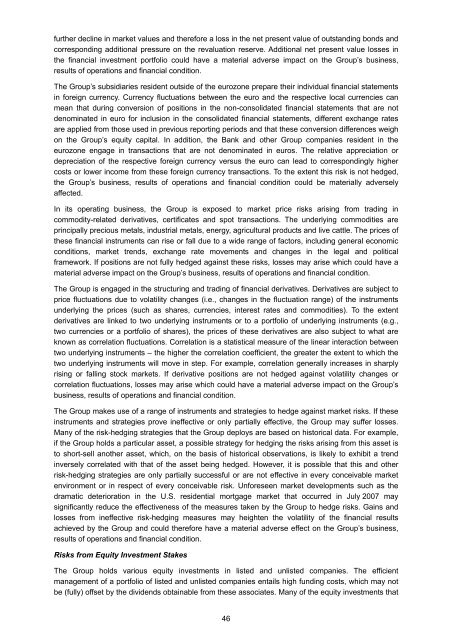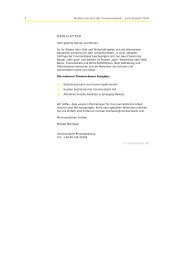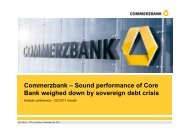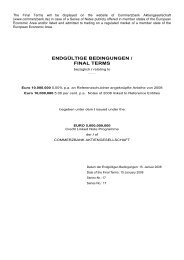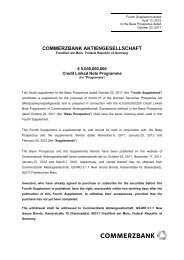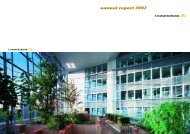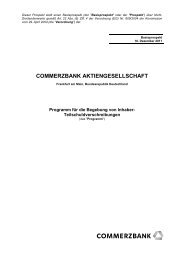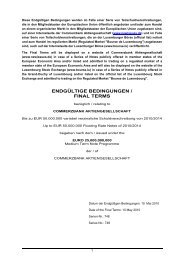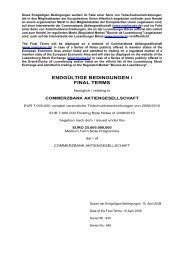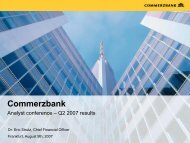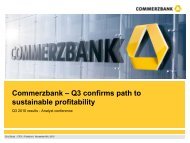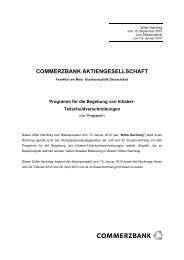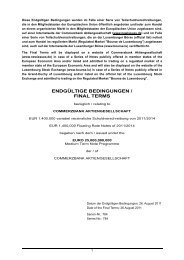COMMERZBANK AKTIENGESELLSCHAFT
COMMERZBANK AKTIENGESELLSCHAFT
COMMERZBANK AKTIENGESELLSCHAFT
Create successful ePaper yourself
Turn your PDF publications into a flip-book with our unique Google optimized e-Paper software.
further decline in market values and therefore a loss in the net present value of outstanding bonds and<br />
corresponding additional pressure on the revaluation reserve. Additional net present value losses in<br />
the financial investment portfolio could have a material adverse impact on the Group’s business,<br />
results of operations and financial condition.<br />
The Group’s subsidiaries resident outside of the eurozone prepare their individual financial statements<br />
in foreign currency. Currency fluctuations between the euro and the respective local currencies can<br />
mean that during conversion of positions in the non-consolidated financial statements that are not<br />
denominated in euro for inclusion in the consolidated financial statements, different exchange rates<br />
are applied from those used in previous reporting periods and that these conversion differences weigh<br />
on the Group’s equity capital. In addition, the Bank and other Group companies resident in the<br />
eurozone engage in transactions that are not denominated in euros. The relative appreciation or<br />
depreciation of the respective foreign currency versus the euro can lead to correspondingly higher<br />
costs or lower income from these foreign currency transactions. To the extent this risk is not hedged,<br />
the Group’s business, results of operations and financial condition could be materially adversely<br />
affected.<br />
In its operating business, the Group is exposed to market price risks arising from trading in<br />
commodity-related derivatives, certificates and spot transactions. The underlying commodities are<br />
principally precious metals, industrial metals, energy, agricultural products and live cattle. The prices of<br />
these financial instruments can rise or fall due to a wide range of factors, including general economic<br />
conditions, market trends, exchange rate movements and changes in the legal and political<br />
framework. If positions are not fully hedged against these risks, losses may arise which could have a<br />
material adverse impact on the Group’s business, results of operations and financial condition.<br />
The Group is engaged in the structuring and trading of financial derivatives. Derivatives are subject to<br />
price fluctuations due to volatility changes (i.e., changes in the fluctuation range) of the instruments<br />
underlying the prices (such as shares, currencies, interest rates and commodities). To the extent<br />
derivatives are linked to two underlying instruments or to a portfolio of underlying instruments (e.g.,<br />
two currencies or a portfolio of shares), the prices of these derivatives are also subject to what are<br />
known as correlation fluctuations. Correlation is a statistical measure of the linear interaction between<br />
two underlying instruments – the higher the correlation coefficient, the greater the extent to which the<br />
two underlying instruments will move in step. For example, correlation generally increases in sharply<br />
rising or falling stock markets. If derivative positions are not hedged against volatility changes or<br />
correlation fluctuations, losses may arise which could have a material adverse impact on the Group’s<br />
business, results of operations and financial condition.<br />
The Group makes use of a range of instruments and strategies to hedge against market risks. If these<br />
instruments and strategies prove ineffective or only partially effective, the Group may suffer losses.<br />
Many of the risk-hedging strategies that the Group deploys are based on historical data. For example,<br />
if the Group holds a particular asset, a possible strategy for hedging the risks arising from this asset is<br />
to short-sell another asset, which, on the basis of historical observations, is likely to exhibit a trend<br />
inversely correlated with that of the asset being hedged. However, it is possible that this and other<br />
risk-hedging strategies are only partially successful or are not effective in every conceivable market<br />
environment or in respect of every conceivable risk. Unforeseen market developments such as the<br />
dramatic deterioration in the U.S. residential mortgage market that occurred in July 2007 may<br />
significantly reduce the effectiveness of the measures taken by the Group to hedge risks. Gains and<br />
losses from ineffective risk-hedging measures may heighten the volatility of the financial results<br />
achieved by the Group and could therefore have a material adverse effect on the Group’s business,<br />
results of operations and financial condition.<br />
Risks from Equity Investment Stakes<br />
The Group holds various equity investments in listed and unlisted companies. The efficient<br />
management of a portfolio of listed and unlisted companies entails high funding costs, which may not<br />
be (fully) offset by the dividends obtainable from these associates. Many of the equity investments that<br />
46


